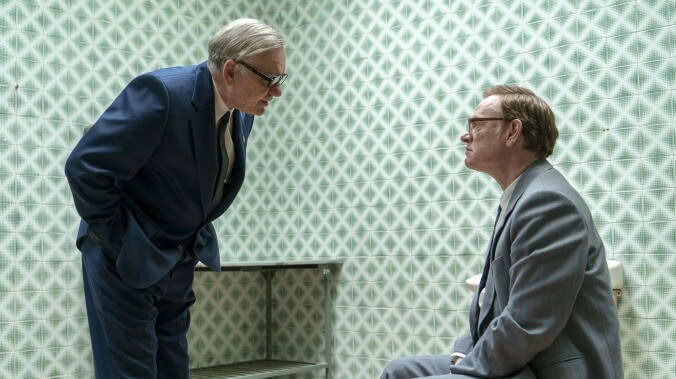Chernobyl is the scariest show of the year


The fifth and final episode of Chernobyl, a miniseries scarier than anything I’ve seen so far this year, feels like a reprieve. On its surface, at least. With every episode, HBO’s chronicle of the 1986 disaster has broadened its scope to investigate, often horrifically, the breadth of the radioactive incident as it impacted the individual, the environment, and the next generation. Last week’s penultimate outing was an especially cruel one, throwing Barry Keoghan’s 18-year old Pavel into the government’s “liquidation efforts,” which included displacing confused villagers, razing the land, and killing every (presumably irradiated) animal in Chernobyl’s orbit. The sight of innocent pets staring down a rifle’s muzzle was one of the worst in a series unafraid to linger on the irradiated, gelatinous bodies and the brave souls selflessly marching towards that fate.
It was something of a relief, then, when “Vichnaya Pamyat” ferried us far from the radioactive air of Chernobyl and the poisoned Ukranian countryside to a clean, insulated courtroom, one where the mere act of breathing isn’t a constant source of anxiety. There, our reluctant hero, Valery Legasov (Jared Harris), is to testify as to the cause of the disaster and, as is dictated by Soviet officials, implicate plant overseers Anatoly Dyatlov (Paul Ritter), Viktor Bryukhanov (Con O’Neill) and Nikolai Fomin (Adrian Rawlins) as its sole causes. That’s not entirely true, of course. For all their disregard and professional maneuvering—the finale opens with a meeting between the three that puts their carelessness on full display—there were failures of design, execution, and maintenance that also contributed to the explosion of Chernobyl’s core, ones officials promise Legasov they’ll address quietly. But, as nuclear physicist Ulana Khomyuk (Emily Watson) reminds him, “Acknowledging the problem is admitting you lied.” It will never happen. Because, if there’s one thing creator Craig Mazin’s hammered home throughout the series, it’s that this is a country defined by its secrets and lies. All politicians lie, but the depth of ego in this particular time and place turned their propaganda into an illusion agreed upon, not only for the people, but also those in charge.
This, of course, is the show’s great moral horror, which, though easier on the eyes than that which came before, is as terrifying as anything we’ve so far encountered on the series, especially in light of its modern resonances. Mazin hasn’t been shy about the parallels he’s drawn between the willful ignorance and political maneuvering of Chernobyl and the modern GOP’s repeated dismissal of climate science. Throughout, Legasov, Khomyuk, and, eventually, even government stooge Boris Shcherbina (Stellan Skarsgård) marvel at how “career party men” routinely deny scientific data and sustainability proposals in order to cut corners and, by extension, justify their own delusions. Legasov’s weary bemusement at the KGB director asking why he should “worry about something that isn’t going to happen” is all of us reading Trump’s trolling tweets about how cold weather negates global warming. The casual obliviousness is infuriating.
Chernobyl, though, isn’t content to be a cautionary tale. There’s a reverence to its narrative, a powerful emphasis on human will and man’s capacity for sacrifice in service of societal survival. Aside from Khomyuk, a composite character Mazin allows to serve as Legasov’s conscience, the show’s characters are deeply, painfully human. “I don’t want to do this any more,” Legasov says in the third episode. In episode five, he justifies not outing the state by acknowledging the years he willfully shaved off his life by traveling to the plant. “I went willingly to an open reactor,” he says. “Isn’t that enough?” He’s exhausted, and you get it. Chernobyl’s fallout was consuming, but its cause came via a thousand cuts. During the trial, audiences are brought back to the night of the accident, and Mazin’s scripts wisely illustrate just how much common workplace power dynamics, tiny oversights, and confusing strike-throughs of ink contributed to utter catastrophe. The finale, in Mazin’s clear-eyed, layman-friendly language, weaves in these moments of awkwardness and sloppiness with scientific breakdowns that even the English majors among us could understand. Minutiae and bureaucracy brought us to brink of apocalypse, because, Christ, of course they did.
It’s rare to find entertainment that imbues import into the mundane so well. Under the exquisite direction of Johan Renck, who cut his teeth on episodes of Breaking Bad and Vikings, terror is injected into the most benign of things—in the irradiated world of Chernobyl, where the air is poison, tree branches ominously swaying in the wind prophesy doom, while dusty chunks of graphite laze like cancerous landmines. This is the horror of Chernobyl, which immerses us in a world where every breath, every object, every exposed cell beckons death. The slasher is much more scary when his fatal cuts strike you silently, painlessly.
Thank god, then, for the characters. Just as Mazin is able to fashion the tragedy’s real-life threats into high-stakes, audience-friendly subplots, he’s also able to spin the archetypal aspects of its real-life players into genuine pathos. Real or not, the odd couple friendship that blossoms between Legasov and Shcherbina is a soothing balm in this scorched world, the latter admitting that meaning only came once he stretched himself beyond bureaucracy. Is it heavy-handed that he subsequently fawns over the larvae climbing up his leg? Of course, but fuck me if this show didn’t earn a renewed appreciation of the creation and resilience of life, no matter how miniscule. We needed this. But, just as a gust of wind takes on added weight in this world, so, too, does the rare smile, the friendship that, in any other context, might seem saccharine.
It nevertheless feels calculated, the showrunner bending reality to the beats of narrative. That’s true of much of “Vichnaya Pamyat,” which feels familiar in ways that its preceding episodes didn’t. That’s not a problem, necessarily, especially since its beats and revelations achieve moments of triumph and tragedy, but the visibility of Mazin’s craftwork does strip away some of the show’s immediacy. It also, though, slows things down somewhat, allowing for both distance and reflection. That’s clearly the place where he and Renck want to leave audiences, as the series closes with an epilogue setting video and photos of the actual players against their real-life fates. It’s appropriately didactic for the material, but also a reminder of just how much the series, up to this point, never played like a moving history lesson. That it was as genuinely entertaining—and compellingly horrific—as it was might be Chernobyl’s most impressive feat of all.
Stray observations
- Chernobyl was gorgeously structured, threading its main narrative through an episodic approach that allowed for a number of minor characters and stories. There were plenty of memorable supporting players, but I’d particularly like to call out Alex Ferns’ Glukohov, the confident, defiant leader of the miners, and Fares Fares, who, as Bacho, brought a grounded humanity to the liquidators’ gruesome animal extermination. The ever-reliable Keoghan gamely sold Pavel’s descent into darkness, but Fares’ Bacho brought an amiable, curt care to the show’s most difficult scenes.
- Also want to take a moment to shout out Hildur Gudnadottir’s incredible, unnerving score. Though nothing shatters the nerves like a crackling dosimeter, Gudnadottir’s looping, elegiac drones evoked the rotting wail of a distant siren, serving as an audial manifestation of the poisonous air.
- Nice to see Michael McElhatton, who you might recognize as Game Of Thrones’ Roose Bolton, in the courtroom. His voice still chills.
- “Boris, you were the one who mattered most.”